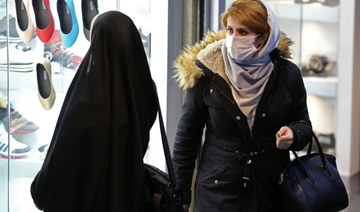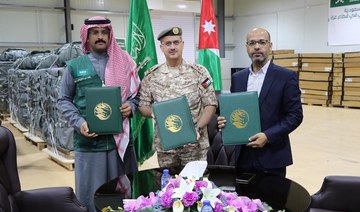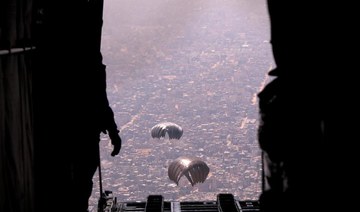DUBAI: Iran’s interior ministry on Sunday said voter turnout in last week’s parliamentary elections stood at 42.57%, the lowest ever since the country’s 1979 revolution that ushered in a Shiite clerical government to power.
The lower turnout is widely seen as a measure of how Iranians view the country’s government and signals possible widespread dissatisfaction with Iran’s clerical rulers and the system they preside over.
In comparison, turnout was nearly 62% in the 2016 elections. Turnout has consistently been above 50% since the country’s revolution some four decades ago.
Iran’s supreme leader and other senior officials had urged people to cast their ballots on Friday as a show of resistance in the face of US pressure and sanctions that have plunged the economy into recession.
Interior Minister Abdolreza Rahmani Fazli said the lowest turnout from the vote was is the capital, Tehran, with just 25.4% of eligible voters casting ballots. He said the country voted under less-than-ideal circumstances, but nevertheless, “we believe that the number of votes and the turnout is absolutely acceptable.”
The elections took place under the threat of the coronavirus, which has killed eight people in Iran and infected 43 people across five cities, including Tehran. Iran reported its first case of the virus two days before the national polls.
Opinion
This section contains relevant reference points, placed in (Opinion field)
A range of crises has beset Iran in the past year, including widespread anti-government protests in November sparked by a rise in prices. There were also protests after the accidental downing of a passenger jet by Iran’s Revolutionary Guard amid heightened tensions with the US in January. Authorities initially tried to cover up the cause of the crash.
Voters also had limited options on Friday’s ballot, as more than 7,000 potential candidates had been disqualified, most of them reformists and moderates. Among those disqualified were 90 sitting members of Iran’s 290-seat parliament who had wanted to run for re-election.
President Hassan Rouhani had criticized the disqualification of so many moderates by the conservative Guardian Council, which is presided over by Supreme Leader Ali Khamenei. Rouhani said the disqualification was akin to customers being told they have options but being offered just one brand at a store. Still, in the days leading up to the election, he had joined the chorus of official voices urging people to vote.
Iran’s supreme leader on Sunday accused enemy “propaganda” of trying to dissuade people from voting by amplifying the threat of the coronavirus. In remarks from his office in Tehran, Khamenei blamed the “negative propaganda” of Iran’s enemies for trying to discourage people from voting in Friday’s elections.
“Their media did not ignore the tiniest opportunity for discouraging people and resorting to the pretext of diseases and the virus,” he said.
Iran’s hard-liners won all 30 parliamentary seats in Tehran, state TV reported Sunday.
State TV also said that former Tehran mayor Mohammad Bagher Qalibaf, a top contender for the post of parliamentary speaker, was the top winner in the capital, with more that 1.2 million votes.
Nearly 58 million Iranians, out of a population of more than 80 million, are eligible to vote. More than 24 million voted. Almost half, or 48%, were women.
On the eve of the vote in Iran, the Trump administration sanctioned five election officials and Secretary of State Mike Pompeo slammed the election as a “sham.”
Coronavirus clusters in Iran as well as in Italy and South Korea could signal a serious new stage in the global spread of the virus, which originated in China.
Starting Sunday, schools were shut down in Tehran and across 10 provinces for at least two days to prevent the spread of the virus. Authorities have stopped fans from attending soccer matches and closed movie theaters and other venues across the country until Friday.
Officials across Iran had encouraged people to vote in the days leading up to the election, even as concerns over the virus’ spread began to rise.
Iraq and Pakistan, which share borders with Iran, have taken preventive measures to limit the spread of the virus from Iranian travelers. Infected travelers from Iran already have been discovered in Lebanon and Canada. Iraq, Saudi Arabia and Kuwait have also effectively barred Iranians from entry, impacting thousands of religious pilgrims and businessmen.
On Sunday, Iranian Foreign Minister Mohammad Javad Zarif joked about shaking hands with his visiting Austrian counterpart Alexander Schallenberg and told reporters: “We have to shake hands with them, don’t worry I don’t have coronavirus.”
In his meeting with the Austrian foreign minister, President Hassan Rouhani quipped that US sanctions on Iran “are like the coronavirus” causing more fear than the reality, the official IRNA news agency reported. He urged Europe to resist US pressure.
Schallenberg is in Tehran amid efforts by European countries to keep alive Iran’s nuclear agreement with world powers. Regional tensions have steadily risen since the US withdrew from the landmark deal.





























